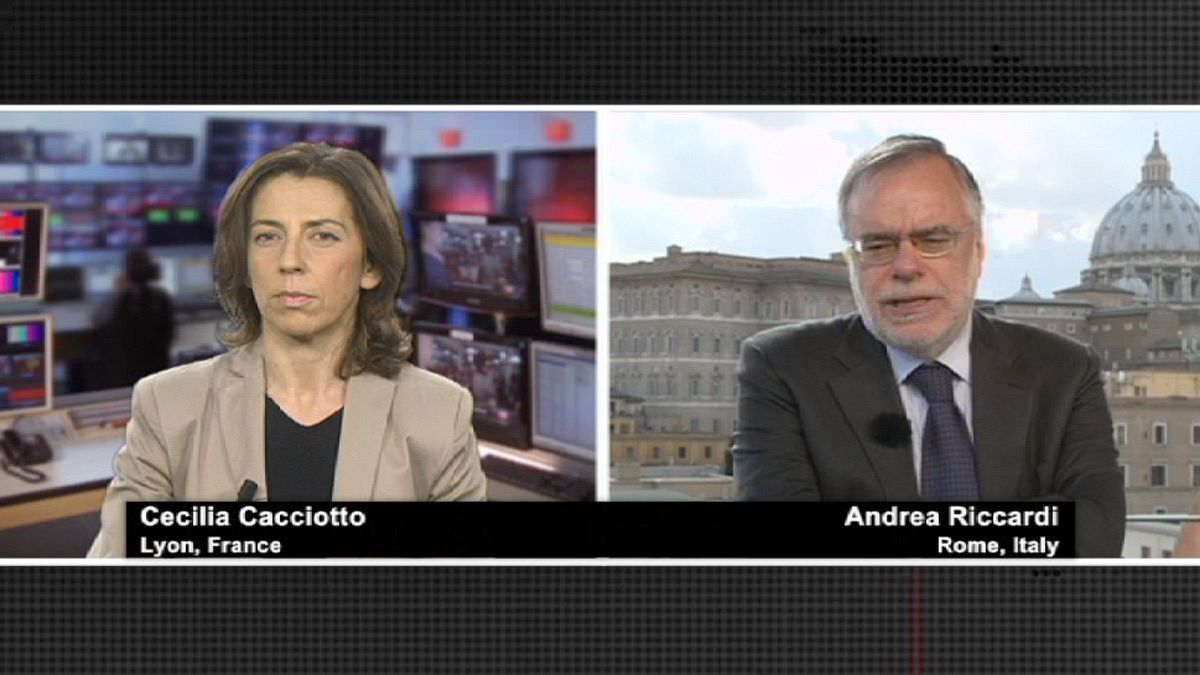What Benedict XVI will leave to posterity and how he will be seen to have contributed to the Roman Catholic Church are questions being posed after the first Pope since the 15th century decided to hand over the keys of Saint Peter on the last day of this month.
To touch on this theme, we spoke with the founder of the Community of Sant’Egidio Andrea Riccardi, a historian and the Minister for International Cooperation in the government of Mario Monti.
Cecilia Cacciotto, euronews: “Hello Minister Riccardi, I’m going to address you as the historian of the Vatican that you also are. How is the Church going to change, if at all, after Ratzinger’s resignation?”
Andrea Riccardi: “In a way, 11 February will remain a historic date, linked to the departure of a Pope who decided to go with a great lucidity and conscience. Many questions have been asked by people who haven’t accepted Joseph Ratzinger’s explanation about his declining physical, intellectual and spiritual strength because of his age. They have looked for other reasons, such as a crisis of Church government or something like that. I think it is difficult to be Pope, run the Roman Catholic Curia, the Church. But there are no other reasons, nothing hidden, which jump out. It’s just about a man who is worn out.”
euronews: “So, you don’t think there’s anything else behind this resignation?”
Riccardi: “No, on the contrary. I believe the Pope waited for the legal case against his butler Gabriel to be over.”
euronews: “The resignation comes just ahead of Italian elections, and now here’s this discreet Pope taking the media by storm. Will this event interfere with Italy’s political elections?”
Riccardi: “The Pope resigning has nothing to do with the Italian elections, but the Italian people, including non-believers, are closely linked to the papal figure. I’ve heard a lot of people asking questions. There’s a lot of uncertainty. How that will manifest itself in electoral terms is difficult to predict.”
euronews: “What will tomorrow’s Pope be like? What sort of Pope does the Church of tomorrow need?”
Riccardi: “That’s hard to say. Today, the Church needs a Pope capable of helping it to grow and become stronger in the world. It needs a charismatic Pope to guide evangilisation, but also a man of government, because the Church is an international reality.”
euronews: “Fifty years ago, the Second Vatican Council laid the foundations for the Church to be modernised. In your opinion, has the right time come for a new Council?”
Riccardi: “Lately, there has been talk about that, once again. Ratzinger, and many who think like him, thought we still had to assimilate the Second Vatican Council. Anyway, I believe we need thinking time, maybe not a Council, but places for reflection which could help the Church find the measure of its dimension, since the Church is so vast and very diversified.”
euronews: “From traditionalism to modernism… how will history remember Joseph Ratzinger?”
Riccardi: “Joseph Ratzinger has been described as a Torquemada, agent of the Inquisition, God’s Rottweiler, but in reality he is a humble man. His papacy was traditional – very appreciated by the Eastern Orthodox for his studies – for his idea of the Church as very traditional. At the same time, his resignation remains a very innovative move. John Paul II died as Pope from a terrible illness. Paul VI was ill and did not step down, even though it had been considered. The same goes for Pious XII, and John XXIII, with a tumour, opened the Second Vatican Council. This move will remain very innovative.”


